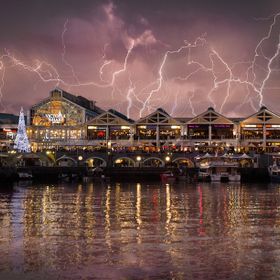jenspm
Follow
Ok so it was long enough after sunset to actually see the stars, but the glow on the horizon made it feel as if the sun had only just gone down. We dragged ours...
Read more
Ok so it was long enough after sunset to actually see the stars, but the glow on the horizon made it feel as if the sun had only just gone down. We dragged ourselves out of bed at abut 3am and drove until we found a clear spot. Then, since it was dark and we could see exactly nothing, a process of guesswork and trial and error ensued to set the cameras up with nice compositions. Which was an extra long process because obviously if you're shooting at night, your shutter speed is 20-30 seconds per shot!
Read less
Read less
Views
456
Likes
Awards
Member Selection Award
Spring Selection Award
Peer Award
Superb Composition
Absolute Masterpiece
Top Choice
Outstanding Creativity
Magnificent Capture
Superior Skill
Genius
All Star
Top Ranks
Categories
Same photographer See allBehind The Lens
Discover more photos See all
Behind The Lens
Location
I took this photo in a sparsely populated area of the Mpumalanga province in South Africa. The remoteness is necessary to actually be able to see the stars.Time
I dragged my butt out of bed at 3am in the morning *whilst on holiday* (#youknowyoureaphotographerwhen) to get this photo. That was the only way it was going to be dark enough and quiet enough to get this shot - plus the Milky Way needed to be sufficiently visible across the whole sky.Lighting
There is normally too much light pollution to get the stars in any kind of urban area - that's why you need to be somewhere really remote. This was a lot of fun to try and compose because I literally could not see anything through the view finder. I put my camera on the tripod, pointed it in an upwardly direction, took a shot, and only then could see what I was getting - so I had to keep on moving my tripod and camera every so slightly after each shot to fine tune the framing and composition.Equipment
D7000 camera with a Sigma 10-20 f.3.5 lens. I shot with the widest aperture, high ISO (6400) and shutter speed of between 20 and 30 seconds.Inspiration
My husband and I were in a remote area on holiday, and being photographers, what do you do on holiday? You look for great photo opportunities, and the area was perfect for star photography. Only downside was not sleeping because we were busy doing this. The sky was wide and open and perfect, the only challenge was finding foreground interest. There were some haggard looking trees around, which were great for adding drama to the whole scene.Editing
Yes, for me post-processing is part of the creative process. There was a slight glow on the horizon from distant settlements, which made the scene feel like it was just after sunset. I enhanced the colours on the horizon and the blue in the sky, and the overall contrast, because I wanted a photo that had a magical fairy-tale like feeling to it.In my camera bag
My camera (duh), a wide lens (10-20) or a kit zoom lens, a macro lens (105 2.8), an 85 1.8, a 50 1.8 and a 28 1.8. I always carry spare batteries and cards, I usually have an expo disk (to get perfect white balance), a variable ND for at least one of my lenses, and some ND grads. Of course it depends on the gig, so sometimes I carry lights and other gadgets that allow me to attach my camera in weird places.Feedback
Go somewhere remote - away from light pollution, it's the only way to get the Milky Way. There is no camera, no equipment, no settings that can capture the stars for you in a place with too much light. Shoot in manual. Make sure you shoot on your widest aperture. You don't need to be on a 1.4 or 1.8 lens, but do go as wide as you can. Shutter speed at 20 - 30 seconds. ISO super high (6400 is what I used) - don't be afraid of the high ISOs - you're going to have so many stars in your photo that nobody is going to care about grain. This is especially important if you don't have a fast lens, because that high iso is going to compensate for the light you're losing with a smaller aperture. DON'T have the high ISO noise reduction setting on - it will interpret stars as noise and delete them. Put your lens on manual focus, and focus on infinity. Use a tripod, and set your camera to timer delay - since your shutter is so slow, the movement of pressing the button to take the photo will introduce camera shake. It also helps to do some research on the sky - the Milky Way is not always visible across the whole sky, and it's often at different angles. You may also want to shoot when there is no moon out, because the moon introduces more light pollution.































